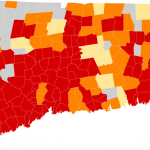“Whenever and however you celebrate, having a holiday season is important for wellbeing,” says UConn Board of Trustees Distinguished Professor Sandra Chafouleas. “Holidays set aside time for relaxation, reflection and reliable traditions — a trio that has become increasingly important as the world has gotten more chaotic and less predictable. Whether you approach them from a spiritual, social or cultural perspective, celebrating holidays can offer a ‘super big dose’ of positive emotions like joy, gratitude, serenity, hope, pride and love.
People tend to look at maps as information that should be taken as fact without the need for analysis, but that’s a mistake. When the average person consumes information through sources like television, radio, a website, or a newspaper, they might do it with a critical eye. What is the viewpoint of the news outlet? Has it been trustworthy in the past? Is there another source for this information to get a second opinion? A map is different. People tend to look at maps as absolute information that should be taken as fact without analysis. But that’s a mistake, according to a pair of UConn professors from the Neag School of Education in a recent article published in Social Studies Research and Practice.
When the average person consumes information through sources like television, radio, a website, or a newspaper, they might do it with a critical eye. What is the viewpoint of the news outlet? Has it been trustworthy in the past? Is there another source for this information to get a second opinion? A map is different. People tend to look at maps as absolute information that should be taken as fact without analysis. But that’s a mistake, according to a pair of UConn professors from the Neag School of Education in a recent article published in Social Studies Research and Practice.
What are phenomena and how can science teachers use these events to engage students in science? Professor of Science Education Todd Campbell joins us to help start a series about using phenemona in science education. Listen to hear about new strategies in how pre-service science educators are being prepared, where to start if you are beginning a journey to adopt NGSS, and how we can all use phenomena to help students explain the world around them.
Sue O’Connell hit the streets to find out about people’s holiday traditions. She also spoke with Neag School of Education Professor Sandra Chafouleas about how important these rituals are to the holiday season.
Friday was International Human Rights Day and the University of Connecticut’s Neag School of Education and Dodd Human Rights Impact Program both recognized the occasion. The virtual event Friday was highlighted by the appearance of U.S. Secretary of Education Miguel Car-dona, who provided opening remarks. The roundtable featured former U.S. Sen. Christopher Dodd, Conard High School teacher Abigail Esposito, UConn graduate student Tyler Gleen and Capitol Region Education Council Civic Leadership High School student Zoe Maldonado.
As part of the observation of International Human Rights Day, the Neag School and Dodd Impact programs are jointly hosting a series of virtual workshops that introduce the intersecting fields of human rights education and civics education to undergraduate and fifth-year students in the Neag School’s pre-service teacher education program and in its Teacher Certification Program for College Graduates, or TCPCG.
“The stress is really the number one reason that we have. The teachers are reporting leaving the field prior to retirement and the rates of stress are increasing across all teachers and increasing at faster rates for elementary school teachers,” Lisa Sanetti, a professor of educational psychology at UConn’s Neag School of Education.
In our last episode, we dove into identifying the gaps between “learning” and “doing”, highlighting the work of University Principal Preparation Initiative. We learned that through thoughtful planning using frameworks developed by Wallace to address the growing need for more collaboration between districts and universities. In this episode, we’re going to dive into a case study of how one UPPI program at University of Connecticut and what they’ve learned from their program redesign. We spoke at length with Richard Gonzales, who oversees the principalship and superintendency program at UConn and serves as the director of UConn’s UPPI initiative project, specifically about the redesign of their core assessments.
“It’s important to have a relatively good handle on the expected number of children coming into a school, coming into a grade, because schools need to plan and districts need to plan way out in advance in terms of hiring new staff or reconfiguring staffing,” said Morgaen Donaldson, a professor at the UConn Neag School of Education.

